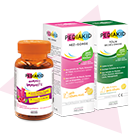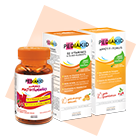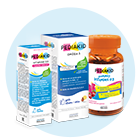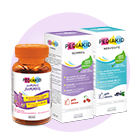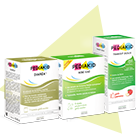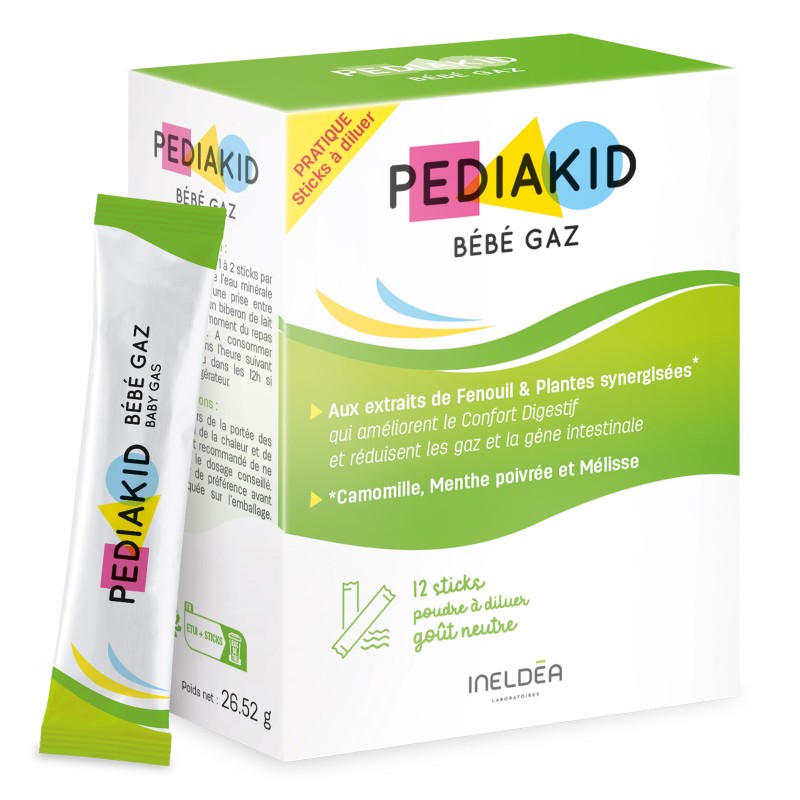
How to soothe a baby distressed by gas and bloating ?
- today mars 25, 2023
Digestive discomfort is common in very young babies.
During the first few months of life, their digestive system is highly sensitive as it does not yet function in an optimum manner. It is therefore perfectly normal for some babies to produce gas 15 to 20 times a day.
Although generally harmless, this can be uncomfortable for the infant and lead to agitation because of a hard or bloated stomach. The infant will draw its little legs up towards the top of the body, cry and try to stretch.
It is upsetting for parents to feel powerless when they see their child so distressed but keep in mind that gas in a baby is, most of the time, harmless and temporary and is part of a baby’s normal development.
You can help the baby to feel better. In fact, there are certain 100% natural solutions that help to relieve gases and bloating. Try to keep calm in this situation and find out what to do when you child has digestive discomfort.
NATURAL SOLUTIONS FOR INTESTINAL COMFORT IN CHILDREN
Phytotherapy, or herbal medicine, is a complementary medicine that is being increasingly used. Based essentially on plants, this alternative medicine has been found to be effective in the treatment of certain ailments. Plant active ingredients therefore play the role of natural remedies.
The advantage of this method is that it can be used for all ages, from toddlers to the elderly.
Fennel
This vegetable with its pleasant aniseed flavour is renowned for its taste and its culinary properties. It is also known for its health benefits.
What are the benefits of fennel ?
This plant is traditionally used for its antispasmodic, anti-inflammatory and analgesic effects. In his time, Hippocrates prescribed it for mothers to encourage milk production during breastfeeding.
These days, fennel herbal tea has been found to be helpful in the case of abdominal pain. It is a remedy for colic and gases in infants. Camomile, lemon balm and vervain are added to reduce crying and soothe bloating.
Fennel, your ally for better digestion in children
On the one hand, the antispasmodic properties of fennel limit the production of intestinal gases, while on the other hand, its flatulence relieving properties stimulate gastric secretion ad intestinal motility. Fennel is therefore one of the best plants to help prevent bloating, flatulence, colitis and stomach ache.
Anethol, its active ingredient with digestive properties, promotes better dilation of the blood vessels in the intestines. The soft fibres which make up fennel are also at the root of its beneficial effect on the digestive system. Added to this is that it is perfectly suited to consumption in the youngest of children. This is why fennel is suggested for the relief of infantile colic.
Camomile
Camomile is a plant whose multiple benefits have been used by specialists for many centuries; even paediatric medicine makes use of it to treat very young children.
What are the medicinal qualities of camomile ?
Camomile is a relaxing plant that helps relieve anxiety, agitation and tension. It can also be used to soothe stomach aches. It has been found that symptoms of colic in infants just a few weeks old quickly disappear thanks to this plant. Many mothers are familiar with these benefits and make fennel infusions for their little ones.
Remedy to treat digestive discomfort in children
Camomile consists of :
- soothing and antispasmodic substances
- polyphenols and flavonoids with anti-inflammatory and antioxidant effects.
It is indicated particularly in cases of heartburn, indigestion, digestive spasms, nausea and vomiting.
Its advantages do not stop there; camomile also relieves common symptoms in babies: bloating, flatulence, spasms and constipation.
Peppermint
Simply touching and rubbing peppermint releases its powerful and pleasant smell. In Spanish, it is called “yerba buena”, meaning the good herb whose beneficial properties are known everywhere in the world.
What are the benefits of peppermint ?
This hybrid plant is part of the Lamiaceae family. It resulted from crossing water mint with green mint. This plant with medicinal properties has more than one advantage but what is of interest to us in this instance is its effect on the digestive system.
Its consumption aids gastric emptying. This means that the stomach empties more quickly and the sensation of distension (swelling) is quickly alleviated. It is therefore recommended in cases of heartburn and bloating.
The many properties of peppermint
Peppermint acts like a tonic as well as a digestive, pancreatic and nerve stimulant. Its spasmolytic properties, which help decrease spasms, are beneficial in cases of nausea, gases or inflammation of the intestine. Its anti-inflammatory effects are clinically proven. This effect makes it a recommended remedy for flatulence in infants.
The World Health Organisation permits the use of this plant in the form of herbal teas to soothe minor digestive problems and aerophagia (excessive swallowing of air). As an infusion, it is often combined with cumin, green aniseed, fennel, lemon balm and feverfew.
Relieve bloating in babies with lemon balm
This perennial herbaceous plant with a much-appreciated citrus scent originates in the Mediterranean basin. It comes from the same family as mint. It is an extremely mild herb whose benefits are noticeable at any age and it is even recommended in children under the age of three years.
Lemon balm has digestive and relaxing properties.
Just like fennel, camomile and peppermint, its use is recommended in the form of a herbal tea or infusion to benefit from its properties. Give your little one a teaspoon of this fluid several times a day. Its effects are guaranteed!
SOME ADVICE ON HOW TO SOOTHE A BABY DISTRESSED BY GAS
Flatulence in new-born babies is caused by several factors. In some cases, the digestion of lactose and other nutrients in breastmilk (or powdered milk) causes intestinal gas. Many mothers who breastfeed add cumin and thyme to their food as this seems to have an effect on the baby’s digestion.
It is also possible that the baby might swallow too much air when sucking so it is important to make sure the baby’s mouth covers the nipple fully during breastfeeding.
If this is not the issue, it is advisable to start a food diary listing the ingredients the mother consumes. This makes it possible to target the trigger for digestive discomfort. Some foods such as broccoli, cabbage, beans or fruits can cause gas in both babies and adults.
Massaging the stomach or using a cherry stone pillow can also be soothing for the baby. Finally, do not forget you can always stand up and place your little one on your forearm. Let the baby lie on its stomach with the head close to the crook of your arm as this helps evacuate gases more easily and soothes your little one.
Finally, PEDIAKID offers a natural and practical solution combining natural extracts of fennel, peppermint, camomile and lemon balm: PEDIAKID Baby Gas. Presented in the form of sticks to be diluted in a little water or milk, PEDIAKID Baby Gas helps to improve baby’s digestive comfort and reduces gases and bloating.





